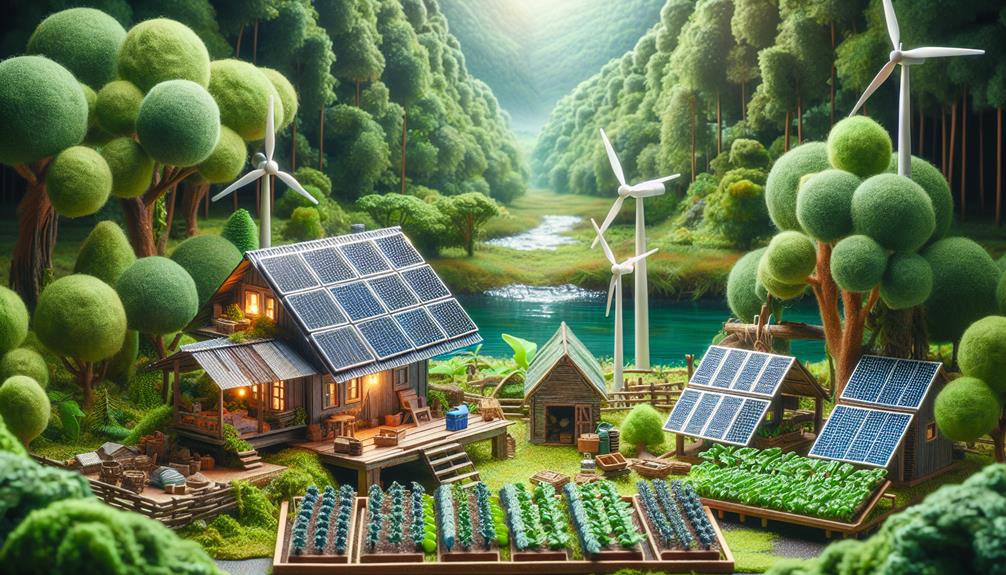Living off the grid is like embarking on a journey into the unknown, a path less traveled where modern conveniences are left behind and self-sufficiency becomes your compass. Imagine disconnecting from the noise and chaos of the mainstream world, embracing a simpler way of life that is in tune with nature and your own innate abilities.
Living Off The Grid
But how does one navigate through this uncharted territory? How do you find the right location, generate sustainable energy, secure water and food sources, and acquire the essential skills needed to thrive in this off-grid lifestyle?
Step into this fascinating world and discover the answers that await you.
Key Takeaways
- Opt for eco-friendly materials and sustainable housing options
- Connect with existing off-grid communities for support and knowledge sharing
- Harness renewable energy sources like solar power for self-sufficiency
- Implement rainwater harvesting and permaculture gardening for water and food sources
The Basics of Off-Grid Living
If you’re considering living off the grid, it’s important to understand the basics of this lifestyle. One of the key aspects to consider is sustainable housing options. When choosing a home, opt for eco-friendly materials such as reclaimed wood, recycled materials, or even tiny houses that minimize environmental impact. These sustainable housing options not only reduce your carbon footprint but also provide a cozy and efficient living space.
Another essential aspect of off-grid living is managing waste disposal. Since you won’t have access to traditional waste management systems, it’s crucial to adopt sustainable practices. Composting is an excellent way to reduce organic waste and create nutrient-rich soil for your garden. Additionally, consider implementing a greywater system that filters and reuses water from showers, sinks, and laundry. This reduces water consumption and promotes a more sustainable lifestyle.
Living off the grid requires careful consideration of sustainable housing options and waste management. By choosing eco-friendly materials for your home and adopting practices like composting and greywater systems, you can minimize your environmental impact and live in harmony with nature.
Embrace this lifestyle, and you’ll not only reduce your carbon footprint but also contribute to a more sustainable and connected world.
Choosing the Right Location
To continue your journey towards living off the grid, it’s important to carefully consider the right location for your sustainable lifestyle. When choosing a location, there are two key factors to keep in mind: finding community and legal considerations.
Finding community is essential for feeling a sense of belonging and support in your off-grid lifestyle. Look for areas where like-minded individuals or existing off-grid communities are already established. This will provide you with a network of people who share your values and can offer guidance and assistance when needed. Online forums and social media groups focused on off-grid living can also help you connect with others who are on a similar path.
Legal considerations are another crucial aspect to take into account. Research local zoning and building regulations to ensure that your off-grid lifestyle is legal and compliant. Some areas may have restrictions on alternative energy systems, water collection, or even living off-grid altogether. It’s important to understand the legal landscape and be prepared to navigate any potential challenges or limitations.
Generating Sustainable Energy
Maximize your self-sufficiency by harnessing renewable energy sources for your off-grid lifestyle. When it comes to generating sustainable energy, solar power efficiency and wind turbine installation are two key factors to consider.
Solar power is a reliable and cost-effective option for off-grid living. Investing in high-quality solar panels and batteries will ensure that you can power your home even during cloudy days. To maximize solar power efficiency, position your panels in an area that receives the most sunlight throughout the day. Additionally, regular maintenance and cleaning of your solar panels will optimize their performance.
Another viable option is installing a wind turbine. Wind power is abundant in many off-grid locations, making it a sustainable energy source. Before installing a wind turbine, assess the average wind speed in your area to determine its feasibility. You should also consider any local regulations or permits required.
Water and Food Sources
Now that you have taken steps to generate sustainable energy for your off-grid lifestyle, let’s explore the essential aspects of securing water and food sources. Living off the grid requires careful planning and resourcefulness when it comes to water and food. Here are some practical ways to ensure a steady supply:
- Rainwater collection: Harvesting rainwater is an excellent way to meet your water needs. Install a system that collects rainwater from your roof and stores it in tanks or barrels. Use this water for drinking, cooking, and watering your plants.
- Permaculture gardening: Embrace the principles of permaculture to create a self-sustaining food system. Design your garden to mimic natural ecosystems, incorporating diverse plants that support each other. Use organic methods and composting to enrich the soil and reduce waste. Grow a variety of fruits, vegetables, and herbs to provide a well-rounded diet.
- Aquaponics: Consider setting up an aquaponics system, which combines aquaculture (fish farming) with hydroponics (growing plants in water). The fish waste provides nutrients for the plants, while the plants filter the water for the fish. This closed-loop system ensures a constant supply of fresh fish and vegetables.
Essential Skills for Off-Grid Living
Developing essential skills is crucial for successfully living off the grid, as they enable you to adapt to a self-sufficient lifestyle and thrive in a remote environment. When it comes to self-sufficiency skills, there are a few key areas to focus on.
First and foremost, it’s important to learn how to generate your own power. This can be done through the use of solar panels, wind turbines, or even hydroelectric systems if you have access to a water source.
Additionally, learning how to grow your own food and preserve it through canning or drying techniques is essential for long-term sustainability.
Another important skill to have is the ability to manage waste disposal. Since you won’t have access to traditional waste management services, it’s important to learn how to compost organic waste and properly dispose of non-biodegradable materials. This will help minimize your impact on the environment and ensure a clean and healthy living space.
Finally, it’s important to learn basic first aid and emergency response skills, as living off the grid can sometimes mean being far away from medical assistance.
Frequently Asked Questions
How Do I Handle Waste Management When Living off the Grid?
When living off the grid, you can handle waste management by using composting toilets and implementing recycling methods. These sustainable practices allow you to minimize your environmental impact and live in harmony with nature.
Are There Any Legal Requirements or Permits Needed for Off-Grid Living?
When living off the grid, it’s important to be aware of any legal requirements or permits needed. This includes waste management regulations, communication challenges, and suitability for families or elderly individuals. Stay informed and prepared.
What Are the Potential Challenges or Risks of Living off the Grid?
Living off the grid can come with challenges and risks. It’s important to be prepared for potential power outages, limited access to resources, and the need for self-sufficiency. However, the rewards of independence and simplicity can outweigh the difficulties.
How Can I Maintain Communication and Stay Connected With the Outside World When Living off the Grid?
To maintain communication and stay connected with the outside world while living off the grid, consider alternative energy sources like solar power for charging devices, use satellite phones or radios, and explore internet options via satellite or mobile data.
Is Off-Grid Living Suitable for Families With Children or Elderly Individuals With Special Needs?
Living off the grid can be challenging for families with children or elderly individuals with special needs. Family dynamics and accessibility concerns must be carefully considered. However, with proper planning and support, it can still be a rewarding and fulfilling lifestyle.
Conclusion
So there you have it, living off the grid may seem like a challenge, but with the right location, sustainable energy sources, and knowledge of essential skills, it can be a rewarding and fulfilling way of life.
So go ahead, embrace your inner pioneer and start living off the grid. It’s time to ditch the grid and embrace the freedom of self-sufficiency.





